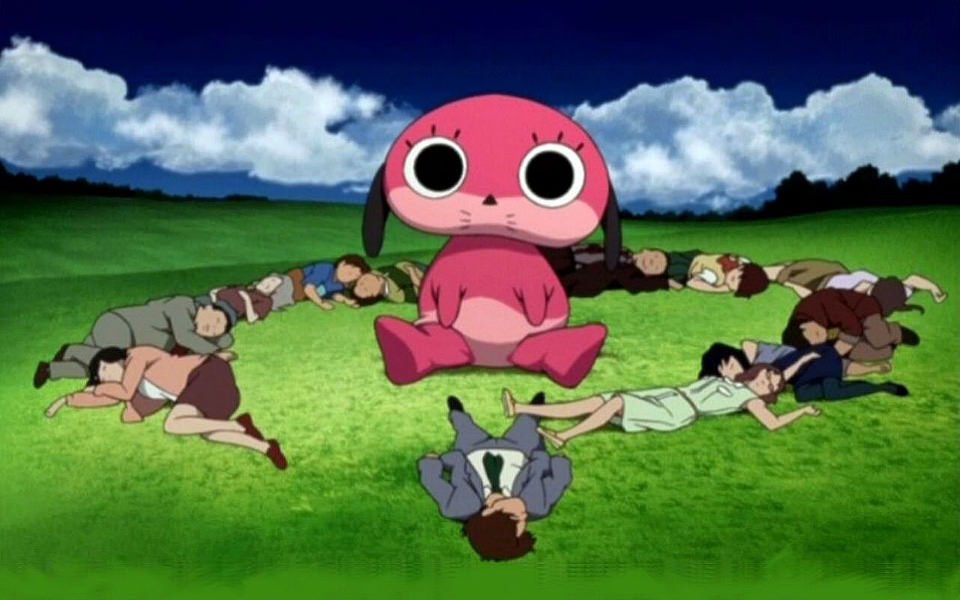An Anime Primer, #3: House of Five Leaves, Paranoia Agent, Macross Plus

House of Five Leaves by Tomomi Mochizuki

House of Five Leaves is a boy-meets-gang coming-of-age story told in twelve slow, sedate episodes. The location is feudal Japan, the boy is a traumatized shy ronin named Akitsu, and the gang he reluctantly joins is a band of enigmatic kidnappers. But sedate is not the same as boring, and House of Five Leaves is proof of that. Its pace is the result of excellent, deliberate plotting, rather than lack of subject matter.
Once the story and its characters sink in — the animated low-key realism helps a lot here — they do not let you go. All of the protagonists, including Akitsu himself, have several deeper layers, and these add to the narrative’s richness. Like in a good soap, you do want to find out how everyone will react to every new revelation forced aboveground by Akitsu’s naïve and clumsy manners. It may not have any big “money shot” moments and the facial animation takes getting used to, but it is a thrilling piece of character-driven drama and one of my absolute favorite anime ever. — Ard Vijn, from his Twitch review
Note: House of Five Leaves is currently streaming on Hulu.
Paranoia Agent by Satoshi Kon

The late (and lamented) Satoshi Kon’s 13-episode series Paranoia Agent starts with a young woman being hospitalized after being hit on the head. She claims the perpetrator was a youth on rollerblades carrying a baseball bat, but the police discover the woman was under a great deal of work-related stress and may have fabricated the story to explain a self-inflicted injury. However, other people also start to be hit by this boy and soon, “Shonen-Bat” (as he is called in the media) becomes a nationwide phenomenon.
I cannot recommend Paranoia Agent enough. The series forms a single gripping arc, although in the middle the series wavers and moves all over Japan, showing the escalating “Shonen-Bat” hysteria without furthering the story any. Still, even this middle part contains episodes which are absolute gems. Few people could show insanity, dreams, and hallucinations like Satoshi Kon could, and this series shows all of his strengths in full. — Ard Vijn
Macross Plus by Shōji Kawamori, Shinichiro Watanabe

I suppose it wouldn’t be right to put together a list of recommended anime without including at least one mecha title. Mecha, or giant robots, are pretty much an anime staple — consider the long-running Gundam franchise. However, when it comes to giant robots, it has always been the Macross titles that have caught my eye. I suppose that’s largely due to my childhood fascination with Robotech, the Americanized version of the original Macross series, and the first anime I ever paid attention to.
But as was the case with the original Macross, the giant transforming robots in Macross Plus — cool as they are — are really just window dressing for a surprisingly poignant melodrama about three former childhood friends and the trauma that shattered their relationship. Two of the friends, now elite test pilots, are rivals in a heated government project to determine the military’s next weapon. When the third friend, a young woman who is a producer for the galaxy’s most famous virtual singer, arrives on their planet, old hurts and wounds are reopened.
The virtual singer sideplot is a bit distracting at times, but the central storyline contains a definite melancholy and gravitas, making this the most affecting Macross title I’ve seen. Of course, this being a Macross title, there’s plenty of aerial combat sequences, and they’re all incredibly thrilling and beautifully animated, and work well as an extension of the central emotional conflict. Another bonus is Yoko Kanno’s eclectic score, which veers from sorrowful piano pieces to pulsing techno, and perfectly complements the visuals. Oh, and the related toys (this is a mecha series, after all) are way cool. — Jason Morehead